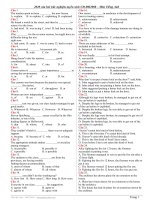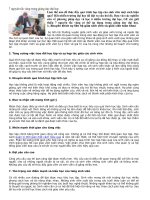- Trang chủ >>
- Luật >>
- Luật thương mại
tieng anh cd dh
Bạn đang xem bản rút gọn của tài liệu. Xem và tải ngay bản đầy đủ của tài liệu tại đây (129.72 KB, 5 trang )
Unit 44: Agree /Co-operate /Disagree /Argue.
Đồng ý
/ Hợp tác
/ Bất đồng
/ Tranh cãi.
Part I
1- to agree [ə'gri:]
a- (with s.o.; about/ on sth; that ...) to (say that you) have the same opinion as someone
else:
nói rằng mình có cùng ý kiến với người khác; đồng ý; nhất trí(với ai về chuyện gì).
I agree with her on most things.
I agree you about not making a decision too quickly.
She agrees that the whole thing is her fault.
b- (to sth/ to do sth) to say yes to something : nói được trước chuyện gì; bằng
lịng(điều gì)
He wouldn't agree to the terms of the contract.
They agreed to give me my money back because it had been their mistake.
c- (with sth) to support or approve of (a moral issue etc.): ủng hộ hay chấp thuận (điều
gì).
I don't agree with violence in any circumstances.
2- to be in agreement [ə'gri:mənt] (formal) to agree: đồng ý ; nhất trí.
They're in complete agreement on the matter.
3- agreed [ə'gri:d] : I agree (used when you have reached a joint decision with
someone about something): tôi đồng ý(được bạn dùng khi đã đạt đến một quyết định
trùng khớp với người khác về một việc nào đó).
'If you cook, I'll do the washing-up.' - 'Agreed.'
4- to come to/reach an agreement : to agree after discussion cook: đi đến / đạt được
thỏa thuận.
We reached an agreement that we would take it in turns to cook.
They came to an agreement not to discuss the subject again.
5- to be in favour (of sth/ of doing sth) to support something; to think that something is
a good idea : ủng hộ ai/ cái gì; cho rằng điều gì đó là một ý hay.
The majority of workers were in favour of strike action.
I'm in favour of leaving now.
6- to accept [ək'sept]
a- (sth) to say yes (to an offer etc.) : chấp nhận (lời đề nghị).
If they make me a good enough offer I'll accept it.
He asked her to marry him and she accepted straight away.
b- (sth/ that ...) to agree or recognize that something is true: đồng ý hay nhận ra rằng
điều gì là đúng; thừa nhận; tin (rằng).
I accept that you were right.
She still can't accept that he's dead.
He refuses to accept the fact that he's wrong
7- to compromise ['kɔmprəmaiz] (with s.0.) to reach an agreement between two
extremes: dàn xếp bằng cách thỏa hiệp.
I'll compromise with you - you can have the car this weekend if I can have it next
weekend.
8- to reach a compromise: to compromise after discussion : đạt tới một sự thỏa hiệp.
We couldn't agree at the beginning but eventually we reached a compromise.
9- to meet ( so. ) halfway: to compromise with someone: dàn xếp với ai; thỏa hiệp với
ai.
You'll have to meet him half way - you won't get everything you want.
10- to co-operate ['kɔ:pərit] (with s.0.) to work or act together with someone; to do
what someone wants in order to help them: hợp tác; cộng tác với ai.
He said he was willing to co-operate with them because he didn't want any trouble.
11- co-operative ['kɔ:pəreitiv] helpful; willing to co-operate: vui vẻ hợp tác; tỏ vẻ
hợp tác.
The secretary wasn’t very co-operative and wouldn’t give me the information I wanted.
12- co-operation [,kɔ:pə'rei∫n] the act of co-operating: sự hợp tác; sự cộng tác.
Thanks to their co-operation, we solved the problem.
Part 2
1- to disagree [,disə'gri:]
a- (with so . on / about sth) to (say that you) have a different opinion from someone
else:
có ý kiến khác(với ai); khơng đồng ý(với ai về việc gì).
We're good friends, even though we often disagree.
I disagree with him about what the best thing to do is.
b- ( with sth) to believe that something is wrong: khơng tin/ chấp thuận(điều gì)(vì
bạn nghĩ điều đó là sai).
I disagree with the Government's education policy.
2- to have a disagreement [,disə'gri:mənt] (with S.O. about sth) (formal) to disagree
verbally: cãi cọ(với ai về chuyện gì).
I had a disagreement with the boss about the work I was doing, so I left.
3- to contradict [,kɔntrə'dikt] (s.0.) to disagree by saying the exact opposite; to tell
someone that they are wrong: phủ nhận; cãi lại.
I can't say anything without him contradicting me.
4- to dispute [dis'pju:t] (sth) (formal) to believe that something isn't true or right: (nghi
ngờ về sự thật hoặc giá trị của cái gì); bàn cãi điều gì.
I dispute the official version of what happened.
5- to object ['ɔbdʒikt](to sth/to doing sth) to feel that something is wrong and not to
like it: phản đối; chống lại.
I object to the way the boss treats me.
I don't object to them coming with us.
6- an objection [əb'dʒek∫n] (to sth/ to doing sth) a reason to disagree; a statement of
disagreement: lý do phản đối; lời phản đối.
There were many objections to the council's plans.
I have no objection to them staying with us.
7- to be opposed [ə'pouzid] (to sth/ to sth) to disagree strongly with or be against
something, often for moral reasons: chống lại cái gì mạnh mẽ; rất phản đối.
The Catholic Church is opposed to divorce.
His parents are opposed to him giving up his education.
8- opposition [,ɔpə'zi∫n] (to sth) strong disagreement: sự chống đối; sự đối chọi.
There is a lot of opposition to the government's defence policy.
9- to argue ['ɑ:gju:] (with s.o./ about sth) to disagree verbally with someone, often
angrily:
tranh cãi/ cãi vã(với ai/ về chuyện gì).
Don't argue with me!
They're always arguing about money.
10- to have an argument ['ɑ:gjumənt] (with s.o./ about sth) to argue: tranh cãi/ cãi
vã(với ai/ về chuyện gì).
I had an argument with him yesterday about the best way to do the job.
11- to row [rou] (with s.o./ about sth) to argue noisily and sometimes violently (often
involving people who know each other well): cãi nhau om sịm/ ầm ĩ(thường dính líu
đến những người quen thân nhau).
She often rows with him in public.
12- to have a row (with s.o./about sth) to row: cãi nhau om sòm/ ầm ĩ.
I had a row with her and now she refuses to speak to me.
They have a lot of rows about money.
13- to quarrel ['kwɔrəl] (with s.o./ about sth) to argue angrily, often about small
things: cãi nhau; giận nhau(thường về những chuyện nhỏ).
The children often quarrel about which programme they're going to watch on TV.
14- to have a quarrel ['kwɔrəl] to quarrel: cãi nhau; giận nhau.
They've had a quarrel so they're not very friendly with each other now.
15- to bicker ['bikə] (about sth) to argue like children, about small things: cãi nhau
như trẻ con về những chuyện không quan trọng.
Will you two stop bickering and let me get some sleep!
They're always bickering about whose turn it is to do the washing up.
16- controversial [,kɔntrə'və:∫əl]causing argument: gây ra tranh luận.
It was a controversial film which shocked many people.
Exercises
I- Choose the word or phrase (A, B, C or D) which best completes each sentence.
1- They're like children, they..............about the most stupid little things.
A dispute
B contradict
C oppose
D bicker
2- They were ............... about who should make the coffee.
A quarrelling
B disputing
C objecting
D opposing
3- I'm not ............... them staying with us, as long as it's only for a few days.
A disagreed with B opposite
C opposed to
D objected to
4- They had a(n) ............... and never spoke to each other again.
A dispute
B objection
C quarrel
D opposition
5- 'So, we're going to Italy for our holidays, right?' - '................ Now whereabouts in
Italy
shall we go?'
A Agree
B I'm agree
C Agreed
D In agreement
6- The players ............... the referee's decision.
A disagreed
B disputed
C objected
D contradicted
II- Fill each of the blanks with one suitable word.
1- You've just ............... yourself. You said the opposite a few minutes ago.
2- We discussed it for a while and then we ............... an agreement.
3- I think you should try to ............... with him. You can't both have everything you
want
4- I don't ............... that. I don't think it's true at all.
5- He wasn't at all................ He wouldn't do anything I asked him to do.
6- Thank you for your invitation which we are pleased to................
7- We look forward to many more years of ............... between our two countries.
8- It is a ............... new law, which many people disagree with.
9- She argues ............... me ............... almost everything.
10- I agree ............... you ............... what the problem is.
11- I've never had the slightest disagreement ............... him ............... anything.
12- I hate to say it, but I disagree ............... you completely.
III- For each of the sentences below, write a new sentence as similar as possible in
meaning to the original sentence, but using the word given. This word must not be
altered in any way.
EXAMPLE
It's no use arguing: I've made up my mind.
point
There's no point in arguing; I've made up my mind.
1- I don't mind changing my plans.
objection______________________________________________________________
2- I thought about it for a while and then I accepted their offer.
agreed________________________________________________________________
3- The neighbours were arguing.
row___________________________________________________________________
4- Do we agree?
agreement_____________________________________________________________
5- I don't like having to pay so much for so little.
object________________________________________________________________
6- He thinks that divorce is wrong.
agree_________________________________________________________________
7- I don't want to argue with you.
argument______________________________________________________________
8- In the end we found a solution that suited us both.
compromise___________________________________________________________
9- I don't think that the way he treats people is right.
disagree______________________________________________________________
10- I'll compromise with you.
meet_________________________________________________________________
11- We've agreed to share the cost.
come_________________________________________________________________
12- I expressed my disagreement with his plan.
opposition____________________________________________________________
13- He thinks that capital punishment is a good idea.
favour________________________________________________________________
14- If you do what I ask, everything will be all right.
co-operate_____________________________________________________________
15- I never have arguments with my parents.
row__________________________________________________________________
ANSWER Unit 44
44.1 1D 2A 3C 4C 5C 6B
44.2 1 contradicted 2 reached 3 compromise 4 accept 5 co-operative 6 accept 7 co-operation
8 controversial 9 with ... about 10 with ... about/ on 11 with ... about 12 with
44.3 1- I have no objection to changing my plans.
2 -I thought about it for a while and then I agreed to their offer.
3- The neighbours were having a row.
4- Are we in agreement?
5- I object to having to pay so much for so little.
6- He doesn't agree with divorce.
7- I don't want to have an argument with you.
8- In the end we reached a compromise.
9- I disagree with the way he treats people.
10- I'll meet you half-way.
11- We've come to an agreement to share the cost.
12- I expressed my opposition to his plan.
13- He is in favour of capital punishment.
14- If you co-operate with me, everything will be all right.
15- I never row with my parents.








